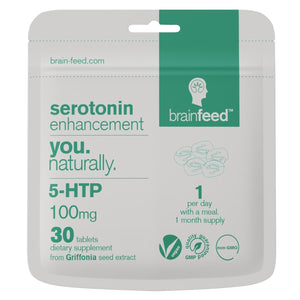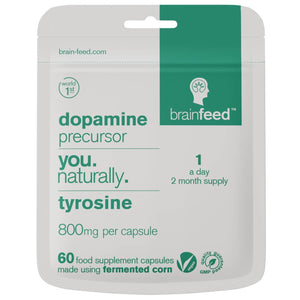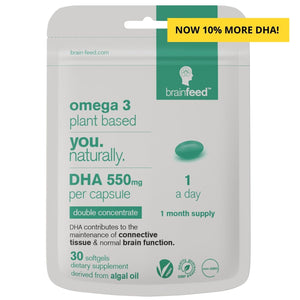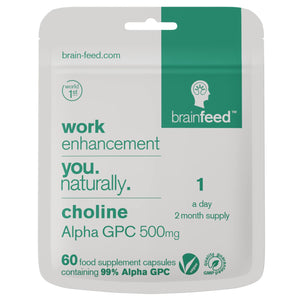Do vegans need supplements? 5 key nutrients to boost mental health for vegans
filter
Nutrition plays a crucial role in maintaining mental well-being, as the right balance of nutrients supports energy levels, mood, and overall mental health. With the growing popularity of veganism worldwide, there’s more to think about than just B12. Science shows that key nutrients play a significant role in the link between a vegan diet and mental health. So, do vegans need supplements to stay fully nourished? The science says they might. Here’s why.
Nutritional makeup of vegan diets
According to the Vegan Society UK, between 2014-2019, the number of vegans has increased fourfold, with 1 in 5 Brits considering going vegan in the future[1 Trusted Source 2021 - The Vegan Society 3rd-party source Worldwide growth of veganism ] . An estimated 13% of Asians, 6% of Americans and 4% of Europeans follow a vegan diet[2 Trusted Source 2022 - Critical Reviews in Food Science and Nutrition Systematic and meta-analysis Evidence of a vegan diet for health benefits and risks – an umbrella review of meta-analyses of observational and clinical studies ] . Why that is? For a myriad of reasons, one stands out - plant-based diets are often glorified due to their expected health benefits. The EPIC-Oxford study, one of the largest studies involving over 2000 vegans, found that vegans had a higher intake of fibre, magnesium, iron, folic acid, vitamins B1, C and E compared to meat eaters[2 Trusted Source 2022 - Critical Reviews in Food Science and Nutrition Systematic and meta-analysis Evidence of a vegan diet for health benefits and risks – an umbrella review of meta-analyses of observational and clinical studies ] . Due to the inclusion of only plant-based foods, it is important to assess the status of animal-sourced nutrients in those who are vegan. Deficiencies of these nutrients are common. What is the most common deficiency in vegans? The EPIC-Oxford study found that vegans had lower intake of Vitamin A, Vitamin B12, Vitamin D, calcium, zinc, and protein[2 Trusted Source 2022 - Critical Reviews in Food Science and Nutrition Systematic and meta-analysis Evidence of a vegan diet for health benefits and risks – an umbrella review of meta-analyses of observational and clinical studies ] . Similar results were highlighted by a 2021 review of 48 studies on the adequacy of vegan diets[4 Trusted Source 2021 - Clinical Nutrition Systematic and meta-analysis Intake and adequacy of the vegan diet. A systematic review of the evidence ] . Similarly, another systematic review concluded that the intake of omega 3, B12 and other nutrients was lower in vegetarians and vegans compared to meat-eaters[5 Trusted Source 2021 - Nutrients Systematic and meta-analysis Nutrient Intake and Status in Adults Consuming Plant-Based Diets Compared to Meat-Eaters: A Systematic Review ] . Some of these nutrients play a central role in brain health and need special attention.
Veganism and diet adequacy
It’s also possible to eat unhealthily on a vegan diet. A study of around 300 vegans found that 40% of the caloric intake was from ultra-processed foods[6 Trusted Source 2021 - The Journal of Nutrition Human study Consumption of Ultra-Processed Foods by Pesco-Vegetarians, Vegetarians, and Vegans: Associations with Duration and Age at Diet Initiation ] . Ultra-processed foods are those that are high in sugars, unhealthy fats, salt, chemicals, and preservatives. Vegan foods are often ultra-processed to enhance the texture, flavour, and taste. This comes at a cost.
What are the symptoms of vitamin deficiency in vegans?
Cognitive decline and mental health issues are common symptoms of nutrient deficiency whenever someone struggles to get those good compounds into their body. Research shows, however, that an estimated 30% of vegans consume insufficient protein[4 Trusted Source 2021 - Clinical Nutrition Systematic and meta-analysis Intake and adequacy of the vegan diet. A systematic review of the evidence ] . This translates into a low intake of building blocks of protein, up to 60% less compared to meat eaters, some of which are essential for brain health[7 Trusted Source 2009 - Acta Neurologica Taiwanica Research evaluation Essential fatty acids and human brain ] . Protein building blocks like tryptophan and tyrosine are needed to produce your feel-good chemical serotonin and your reward and pleasure chemical dopamine. A 2021 review of 13 studies found that vegan diet and mental health were linked[8 Trusted Source 2021 - Nutrition Reviews Systematic and meta-analysis Vegetarianism and veganism compared with mental health and cognitive outcomes: a systematic review and meta-analysis ] . They found veganism and depression were correlated as people with a plant-based diet had a higher risk of depression[8 Trusted Source 2021 - Nutrition Reviews Systematic and meta-analysis Vegetarianism and veganism compared with mental health and cognitive outcomes: a systematic review and meta-analysis ] . An extensive study on 496 participants, however, showed that higher diet (either omnivore, vegetarian or vegan) quality was associated with lower depressive symptoms confirming it’s important what quality food you eat[9 Trusted Source 2023 - International Journal of Environmental Research and Public Health Human study The Association between Vegan, Vegetarian, and Omnivore Diet Quality and Depressive Symptoms in Adults: A Cross-Sectional Study ] . The review listed nutrient deficiencies and low intake of specific protein building blocks as possible reasons for the veganism and depression connection. A decade-long study of 10,000 participants also found that those who consumed 20% of their total daily calories from processed foods had a 25% decrease in mental functions also known as the vegan brain fog[10 Trusted Source 2022 - Independent Human study Study finds link between ultra-processed food and cognitive decline ] . Let’s take a look at how you can elevate your vegan diet beyond supplementing with just vitamin B12.
Support your feel-good chemical serotonin with its natural building block, 5-htp
Your feel-good chemical is made from a compound called tryptophan which is found in protein-rich foods. Tryptophan is converted to 5-htp which is then converted to serotonin, the feel-good chemical that regulates your mood and sleep. Compared to meat eaters, vegans had a 6% lower concentration of tryptophan in their blood[11 Trusted Source 2016 - European Journal of Clinical Nutrition Human study Plasma concentrations and intakes of amino acids in male meat-eaters, fish-eaters, vegetarians and vegans: a cross-sectional analysis in the EPIC-Oxford cohort ] . This matters because only 1-3% of the total dietary tryptophan is converted to serotonin in the brain[12 Trusted Source 2009 - International Journal of Tryptophan Research Research evaluation L-Tryptophan: Basic Metabolic Functions, Behavioral Research and Therapeutic Indications ] . When study participants switched from a meat-eating diet to a vegan diet (excluding all animal products except fish), their tryptophan levels decreased by 60% in 6 weeks[13 Trusted Source 2017 - European Journal of Nutrition Human study Amino acid changes during transition to a vegan diet supplemented with fish in healthy humans ] . What plant-based foods contain tryptophan? The following plant-based protein-rich sources, full of tryptophan, can be incorporated into your diet to improve intake for optimal serotonin production.
|
Food (per 100g) |
Tryptophan content (mg) |
|
Sesame flour |
1100 |
|
Spirulina |
929 |
|
Tofu, dried frozen |
747 |
|
Soybeans, raw |
591 |
|
Pumpkin seeds, roasted |
569 |
|
Chia seeds |
436 |
Supplementing with 5-htp is a shortcut to increasing serotonin during sub-optimal tryptophan intake. brain feed’s 100 mg 5-htp is extracted and isolated from Ghanian Griffonia Simplicifolia seeds. 98% of the tablet is comprised of 5-htp making it the smallest, nutrient-dense tablet available and no unnecessary bulking agents.
Get a boost in the reward and pleasure chemical dopamine with tyrosine
Tyrosine is the precursor for dopamine, which is your reward, motivation and pleasure brain chemical, and it can be ingested with your diet that is rich in protein. Compared to meat eaters, tyrosine intake is almost 40% lower among vegans[14 Trusted Source 2022 - European Journal of Nutrition Human study Amino acid intake and plasma concentrations and their interplay with gut microbiota in vegans and omnivores in Germany ] . How do vegans get tyrosine? It is possible to meet tyrosine needs by including the following sources in your vegan dopamine diet:
|
Food (per 100g) |
Tyrosine content (mg) |
|
Spirulina |
2580 |
|
Tofu, dried frozen |
1600 |
|
Soy flour |
1320 |
|
Hemp seeds |
1260 |
|
Peanuts, roasted |
1140 |
|
Broadbeans (fava beans), raw |
827 |
Vegans with low intake of tyrosine-rich foods can benefit from supplementation. brain feed has created the world’s 1st natural 800mg vegan tyrosine capsule from fermented corn.
Maintain brain health with Omega 3
Omega 3 are healthy fats which contribute to brain, visual and cardio health as they are powerful antioxidants. What is the best form of vegan omega 3? ALA is a type of omega 3 found in plant products, commonly consumed by vegans. ALA can be converted to DHA in the body, however, the conversion is very limited - most scientists suggest that only somewhere between 2 and 10% of ALA gets converted to EPA or DHA[15 Trusted Source 2009 - Lipids in Health and Disease Research evaluation Are all n-3 polyunsaturated fatty acids created equal? ] . Here are the top 5 ALA-rich foods.
|
Food (per 100g) |
Omega 3 (g) (ALA) |
|
Flaxseed oil |
53 |
|
Flaxseed, ground |
19 |
|
Chia seeds |
18 |
|
Walnuts |
9 |
|
Hemp seeds |
8 |
How do vegans get EPA and DHA?
Vegans sometimes struggle to get omega 3’s EPA and DHA, which are commonly found in fatty fish and seafood, however, the good news is, that you can get your daily dose of omega 3 through seeds, nuts and from algae oil. It’s important to get enough DHA as this omega 3 fat is crucial for brain and visual development for children and adults. Structurally, your brain is made of fat[7 Trusted Source 2009 - Acta Neurologica Taiwanica Research evaluation Essential fatty acids and human brain ] . 25% of that fat is DHA, a type of omega 3 fat that directly impacts the resilience of the protective covering of the brain, determining what can enter and exit the brain[16 Trusted Source 2011 - Biochimie Research evaluation Docosahexaenoic acid (DHA) and the developing central nervous system (CNS) - Implications for dietary recommendations ] ,[17 Trusted Source 2016 - Annals of Nutrition and Metabolism Research evaluation Docosahexaenoic Acid ] . It must be taken from the diet and is found in fatty fish, seafood, and algae. Those who consumed higher levels of omega 3 fats were found to have a large volume of brain structures involved in memory, learning and emotions[18 Trusted Source 2007 - Neuroscience Letters Human study Long-chain omega-3 fatty acid intake is associated positively with corticolimbic gray matter volume in healthy adults ] . Vegans, however, were found to have 40-50% less brain-healthy fats like EPA and DHA fats compared to meat-eaters[19 Trusted Source 2013 - The Medical Journal of Australia Research evaluation Omega-3 polyunsaturated fatty acids and vegetarian diets ] . Do vegan omega 3 supplements work? The Academy of Nutrition and Dietetics recommends vegans include an algae-based DHA supplement to meet needs as having enough ALA-rich foods in your diet might cause other problems[20 Trusted Source 2018 - Academy of Nutrition and Dietetics 3rd-party source Omega-3 Fatty Acids and Vegetarian Diets ] . So, here’s one of the vegan DHA sources: brain feed has developed a sustainable and plant-based omega 3 supplement that provides you with 500mg of DHA in just one vegan soft-gel capsule. Use code ‘NEW15’ to get 15% off your first purchase.
Support your learning and memory chemical with choline
Choline is another important brain nutrient that is low in vegan diets but can be ingested with soy products and legumes[21 Trusted Source 2014 - Nutrients Human study Comparison of Nutritional Quality of the Vegan, Vegetarian, Semi-Vegetarian, Pesco-Vegetarian and Omnivorous Diet ] . The body can produce small amounts of choline from natural choline sources. Vegan options are soy, tomatoes and legumes, however, it can be difficult to reach an adequate intake from a diet. Choline is important as it’s used to produce the chemical involved in memory, learning and attention, called acetylcholine. Additionally, choline and DHA work synergistically to enhances cognitive development. Read on choline and DHA brain function benefits. How can a vegan get enough choline? Protein-rich foods are good vegan sources of choline:
|
Food (per 100g) |
Choline content (mg) |
|
Soy flour |
191 |
|
Tofu, fried |
106 |
|
Sun-dried tomatoes |
105 |
|
Chickpeas, raw |
99 |
|
Lima beans, raw |
97 |
|
Lentils, raw |
96 |
Those with low choline in their diet can benefit from supplementation. Alpha GPC is a form of choline that can freely enter the brain to produce acetylcholine. It is 41% choline by weight and can increase choline levels faster than other sources. Alpha GPC can increase acetylcholine levels within 1-3 hours post intake[22 Trusted Source 2014 - Nutrients Human study Comparison of Nutritional Quality of the Vegan, Vegetarian, Semi-Vegetarian, Pesco-Vegetarian and Omnivorous Diet ] . brain feed has created the world’s 1st 500mg vegan Alpha GPC capsule containing 99% Alpha GPC* (the purest form of Alpha GPC).
Soy is a strong contender as a vegan brain food due to being one of the best vegan sources of tryptophan, tyrosine, and choline. Vegans in the EPIC-Oxford study consumed less than 3% of their protein intake from soy[23 Trusted Source 2023 - Examine 3rd-party source Alpha GPC ] . This highlights the importance of supplementation after a thorough analysis of dietary intake.
Vitamin B12
A review of 15 studies established that vegans had the lowest intake of vitamin B12 compared to other diets[4 Trusted Source 2021 - Clinical Nutrition Systematic and meta-analysis Intake and adequacy of the vegan diet. A systematic review of the evidence ] . In countries like Hong Kong and China, up to 80% of vegans were deficient in this vitamin, highlighting the importance of fortified foods and supplementation[24 Trusted Source 2016 - Nutrients Research evaluation B Vitamins and the Brain: Mechanisms, Dose and Efficacy—A Review ] . Vitamin B12 is predominantly found in animal sources. Do you have to take B12 if you’re vegan? Though B12 vitamin food vegan options exist and are found in certain algae and mushrooms, the amounts you can eat are ineffective in meeting the needs[25 Trusted Source 2020 - Medicina Research evaluation Nutritional Status and the Influence of the Vegan Diet on the Gut Microbiota and Human Health ] . In the brain, vitamin B12 is an activator in the production of many brain chemicals including serotonin and dopamine and is therefore important for your mental health[26 Trusted Source 2021 - Foods Research evaluation Foods for Plant-Based Diets: Challenges and Innovations ] .
Do I need to take any supplements as a vegan?
It is entirely possible to meet the needs of brain-healthy nutrients on a vegan diet. Smart choices of whole and fortified foods along with appropriate supplementation are the secret to supercharging a vegan diet for physical and mental well-being.
References
[1] Worldwide growth of veganism (2021). The Vegan Society. https://www.vegansociety.com/news/media/statistics/worldwide
[2] Selinger, E., Neuenschwander, M., Koller, A., Gojda, J., Kühn, T., Schwingshackl, L., Barbaresko, J., & Schlesinger, S. (2023). Evidence of a vegan diet for health benefits and risks—An umbrella review of meta-analyses of observational and clinical studies. Critical Reviews in Food Science and Nutrition, 63(29), 9926–9936. https://www.tandfonline.com/doi/full/10.1080/10408398.2022.2075311
[3] Davey, G. K., Spencer, E. A., Appleby, P. N., Allen, N. E., Knox, K. H., & Key, T. J. (2003). EPIC-Oxford: Lifestyle characteristics and nutrient intakes in a cohort of 33 883 meat-eaters and 31 546 non meat-eaters in the UK. Public Health Nutrition, 6(3), 259–269. https://www.cambridge.org/core/journals/public-health-nutrition/article/epicoxfordlifestyle-characteristics-and-nutrient-intakes-in-a-cohort-of-33-883-meateaters-and-31-546-non-meateaters-in-the-uk/BF14D307B5A33B572CFB2A3050410974
[4] Bakaloudi, D. R., Halloran, A., Rippin, H. L., Oikonomidou, A. C., Dardavesis, T. I., Williams, J., Wickramasinghe, K., Breda, J., & Chourdakis, M. (2021). Intake and adequacy of the vegan diet. A systematic review of the evidence. Clinical Nutrition (Edinburgh, Scotland), 40(5), 3503–3521. https://www.clinicalnutritionjournal.com/article/S0261-5614(20)30656-7/fulltext
[5] Neufingerl, N., & Eilander, A. (2021). Nutrient Intake and Status in Adults Consuming Plant-Based Diets Compared to Meat-Eaters: A Systematic Review. Nutrients, 14(1), 29. https://www.mdpi.com/2072-6643/14/1/29
[6] Gehring, J., Touvier, M., Baudry, J., Julia, C., Buscail, C., Srour, B., Hercberg, S., Péneau, S., Kesse-Guyot, E., & Allès, B. (2021). Consumption of Ultra-Processed Foods by Pesco-Vegetarians, Vegetarians, and Vegans: Associations with Duration and Age at Diet Initiation. The Journal of Nutrition, 151(1), 120–131. https://www.sciencedirect.com/science/article/pii/S0022316622000037?via%3Dihub
[7] Chang, C.-Y., Ke, D.-S., & Chen, J.-Y. (2009). Essential fatty acids and human brain. Acta Neurologica Taiwanica, 18(4), 231–241.
[8] Iguacel, I., Huybrechts, I., Moreno, L. A., & Michels, N. (2021). Vegetarianism and veganism compared with mental health and cognitive outcomes: A systematic review and meta-analysis. Nutrition Reviews, 79(4), 361–381. https://academic.oup.com/nutritionreviews/article-abstract/79/4/361/5850123?redirectedFrom=fulltext
[9] Walsh, H., Lee, M., & Best, T. (2023). The Association between Vegan, Vegetarian, and Omnivore Diet Quality and Depressive Symptoms in Adults: A Cross-Sectional Study. International Journal of Environmental Research and Public Health, 20(4), 3258. https://www.mdpi.com/1660-4601/20/4/3258
[10] Graziosi, G. (2022). Study finds link between ultra-processed food and cognitive decline. Independent. https://www.independent.co.uk/news/world/americas/ultra-processed-foods-dementia-study-b2136447.html#comments-area
[11] Schmidt, J. A., Rinaldi, S., Scalbert, A., Ferrari, P., Achaintre, D., Gunter, M. J., Appleby, P. N., Key, T. J., & Travis, R. C. (2016). Plasma concentrations and intakes of amino acids in male meat-eaters, fish-eaters, vegetarians and vegans: A cross-sectional analysis in the EPIC-Oxford cohort. European Journal of Clinical Nutrition, 70(3), 306–312. https://www.nature.com/articles/ejcn2015144
[12] Richard, D. M., Dawes, M. A., Mathias, C. W., Acheson, A., Hill-Kapturczak, N., & Dougherty, D. M. (2009). L-Tryptophan: Basic Metabolic Functions, Behavioral Research and Therapeutic Indications. International Journal of Tryptophan Research : IJTR, 2, 45–60. https://journals.sagepub.com/doi/10.4137/IJTR.S2129
[13] Elshorbagy, A., Jernerén, F., Basta, M., Basta, C., Turner, C., Khaled, M., & Refsum, H. (2017). Amino acid changes during transition to a vegan diet supplemented with fish in healthy humans. European Journal of Nutrition, 56(5), 1953–1962. https://link.springer.com/article/10.1007/s00394-016-1237-6
[14] Dietrich, S., Trefflich, I., Ueland, P. M., Menzel, J., Penczynski, K. J., Abraham, K., & Weikert, C. (2022). Amino acid intake and plasma concentrations and their interplay with gut microbiota in vegans and omnivores in Germany. European Journal of Nutrition, 61(4), 2103–2114. https://link.springer.com/article/10.1007/s00394-021-02790-y
[15] Anderson, B. M., & Ma, D. W. (2009). Are all n-3 polyunsaturated fatty acids created equal? Lipids in Health and Disease, 8, 33. https://lipidworld.biomedcentral.com/articles/10.1186/1476-511X-8-33
[16] Guesnet, P., & Alessandri, J.-M. (2011). Docosahexaenoic acid (DHA) and the developing central nervous system (CNS)—Implications for dietary recommendations. Biochimie, 93(1), 7–12. https://www.sciencedirect.com/science/article/abs/pii/S0300908410001823?via%3Dihub
[17] Calder, P. C. (2016). Docosahexaenoic Acid. Annals of Nutrition & Metabolism, 69 Suppl 1, 7–21. https://karger.com/anm/article/69/Suppl.%201/8/42341/Docosahexaenoic-Acid
[18] Conklin, S. M., Gianaros, P. J., Brown, S. M., Yao, J. K., Hariri, A. R., Manuck, S. B., & Muldoon, M. F. (2007). Long-chain omega-3 fatty acid intake is associated positively with corticolimbic gray matter volume in healthy adults. Neuroscience Letters, 421(3), 209–212. https://www.sciencedirect.com/science/article/abs/pii/S0304394007005356?via%3Dihub
[19] Saunders, A. V., Davis, B. C., & Garg, M. L. (2013). Omega-3 polyunsaturated fatty acids and vegetarian diets. The Medical Journal of Australia, 199(S4), S22-26. https://onlinelibrary.wiley.com/doi/full/10.5694/mja11.11507
[20] Vogliano, C. (2018). Omega-3 Fatty Acids and Vegetarian Diets. Academy of Nutrition and Dietetics. https://higherlogicdownload.s3.amazonaws.com/THEACADEMY/859dd171-3982-43db-8535-56c4fdc42b51/UploadedImages/VN/Documents/Resources/Omega_3_RDN_Consumer1.pdf
[21] Clarys, P., Deliens, T., Huybrechts, I., Deriemaeker, P., Vanaelst, B., De Keyzer, W., Hebbelinck, M., & Mullie, P. (2014). Comparison of Nutritional Quality of the Vegan, Vegetarian, Semi-Vegetarian, Pesco-Vegetarian and Omnivorous Diet. Nutrients, 6(3), 1318–1332. https://www.mdpi.com/2072-6643/6/3/1318
[22] Crosby, L., Rembert, E., Levin, S., Green, A., Ali, Z., Jardine, M., Nguyen, M., Elliott, P., Goldstein, D., Freeman, A., Bradshaw, M., Holtz, D. N., Holubkov, R., Barnard, N. D., & Kahleova, H. (2022). Changes in Food and Nutrient Intake and Diet Quality on a Low-Fat Vegan Diet Are Associated with Changes in Body Weight, Body Composition, and Insulin Sensitivity in Overweight Adults: A Randomized Clinical Trial. Journal of the Academy of Nutrition and Dietetics, 122(10), 1922-1939.e0. https://www.jandonline.org/article/S2212-2672(22)00235-0/fulltext
[23] Murray, M. & Michaux, M. (2023). Alpha-GPC Research Breakdown. Examine. https://examine.com/supplements/alpha-gpc/research/
[24] Kennedy, D. O. (2016). B Vitamins and the Brain: Mechanisms, Dose and Efficacy—A Review. Nutrients, 8(2), 68. https://www.mdpi.com/2072-6643/8/2/68
[25] Sakkas, H., Bozidis, P., Touzios, C., Kolios, D., Athanasiou, G., Athanasopoulou, E., Gerou, I., & Gartzonika, C. (2020). Nutritional Status and the Influence of the Vegan Diet on the Gut Microbiota and Human Health. Medicina, 56(2), 88. https://www.mdpi.com/1648-9144/56/2/88
[26] Alcorta, A., Porta, A., Tárrega, A., Alvarez, M. D., & Vaquero, M. P. (2021). Foods for Plant-Based Diets: Challenges and Innovations. Foods, 10(2). https://www.mdpi.com/2304-8158/10/2/293


 alertness
alertness
 cognition
cognition
 sleep
sleep
 wellbeing
wellbeing









1 comment
Another words a purely vegan diet that is healthy is a luxury of "civilisation ". Without numerous industrially produced supplements the vegan diet has significant impacts on brain health. Maybe this is why there is so much proselytizing among vegans attempting to convince the non-vegans to become part of "natural " but totally unnatural movement. Far from saving the planet a massive shift to veganism would have untold damage to ecosystems- overclearing, mono- cropping, mono- vegetables and fruit, with associated chemical inputs that are already damaging life on Earth significantly, especially insects and other invertebrates that are the animal base of ecosystems.
Organic agriculture often quoted as the solution, is a form of soil mining and has become as industrialised as chemical farming and owned by giant corporations (such as Sanitarium)intent on promoting vegetarianism and veganism.
Leave a comment
Open tab